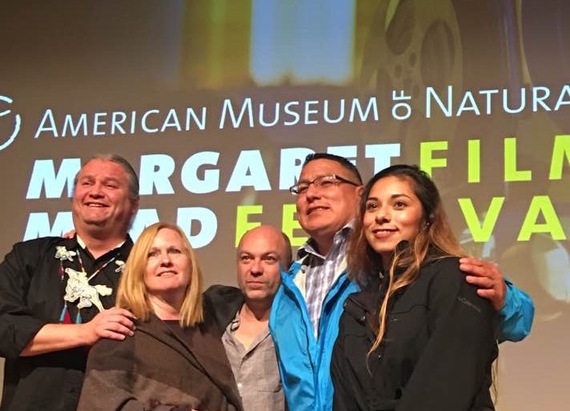In one of the most outrageous attempts to silence the press in memory, Democracy Now's Amy Goodman is slated to enter a Law Enforcement Facility in Morton County North Dakota this afternoon and turn herself in to face charges of "rioting" because she posted video of protests against the the Dakota Access Pipeline in Cannon Ball, North Dakota. In the weeks ahead, also in Morton County, actress Shaliene Woodley will face charges for trespassing and documentary film Producer Deia Schlosberg is facing more serious felony charges for documenting the same movement.There has rightly been uproar in the progressive media and in the documentary film world about all three of these cases. The prosecutor, Ladd R Erickson has already stated that Amy Goodman is not a bona fide journalist because she represented a biased view of events last month. Her defence will likely be that she was exercising FIrst Amendment Rights afforded to the press. It seems that filming actual events is under threat in North Dakota. The arrest of three high-profile woman is a calculated move by local authorities to scare off protesters and silence dissent about oil industry incursions into sovereign Indian territory.
As the producer of the feature documentary A Different American Dream, about the impact of fracking on the neighboring Fort Berthold Indian reservation, I can reel off countless examples of harassment during months of filmmaking last year. During scouting my director Simon Brook and I were targeted by local non-tribal police. They threatened Simon with deportation by Homeland Security (he is not a US citizen). While filming we were randomly chased off sites by private security firms who threatened to take our cameras and destroy our footage. Even while our cameras were rolling a series of oil leaks and fires occurred: in two cases we were out with the Tribal Environmental Officers. We soon discovered that they are so disempowered that in each case they learned of the fire from seeing the smoke while our cameras were rolling. They were not officially informed by the oil companies until after the fires were controlled. In one case we were close enough to drive with an officer to the fire, but not permitted to enter the "containment zone" or interview fire-fighters or oil company workers. In the case of a large spill adjacent to the reservation a tribal member begged us not to film it or disclose that it had occurred because he feared he would lose his job if news of the leak was traced back to him.
These ominous threats are not unique to Fort Berthold or to egregious overreaches by the oil industry. They are the stock in trade of hundreds of corporations to silence whistle-blowers. But on an isolated Indian Reservation with few economic opportunities beyond its geographical boundaries flouting tribal leadership that may be in thrall of oil companies is a potential economic death sentence. How can we expect tribal members whose entire family livelihood depends on acceptance of inevitability and tribal tact speak out? If they lose their jobs for speaking out, where can they go to find alternative employment?
The protagonists of our film are brave and articulate. It was inspiring to listen to them at the Q and A after the premiere at the Margaret Mead Film Festival at the American Museum of Natural History on Saturday night. They were open, funny and moving. What emerged all too clearly was what they describe as economic imprisonment. There are few jobs outside of the tribal structure and on Fort Berthold the tribe's economic hopes are intertwined with the oil industry, for their reservation sits right in the middle of the largest shale oil field in North America. The members of the MHA Nation who are gravely concerned about the impact of fracking on their ancestral land need massive amounts of support. Their tribal EPA needs the authority and the financial resources to fully monitor and police the fracking that is already happening. They need more than an independent documentary film or a New York Times Op-Doc. They need the eyes and economic heft of all sentient human beings who recognize that climate change is real and that poisoning their ancestral homelands is a continuation of centuries of genocide and oppression.
It's important to remember that protest and challenging the status quo remain the privilege of those of us who have economic independence. As appalling as it is that Amy Goodman and the other celebrities have been targeted by Morton County Prosecutor Ladd R Erickson, they do have a network of lawyers, financial supporters and the solidarity of the press. Not so the members of the MHA Nation whose concerns have been silenced far too long. For most Native Americans the risks of speaking out are incalculable.
